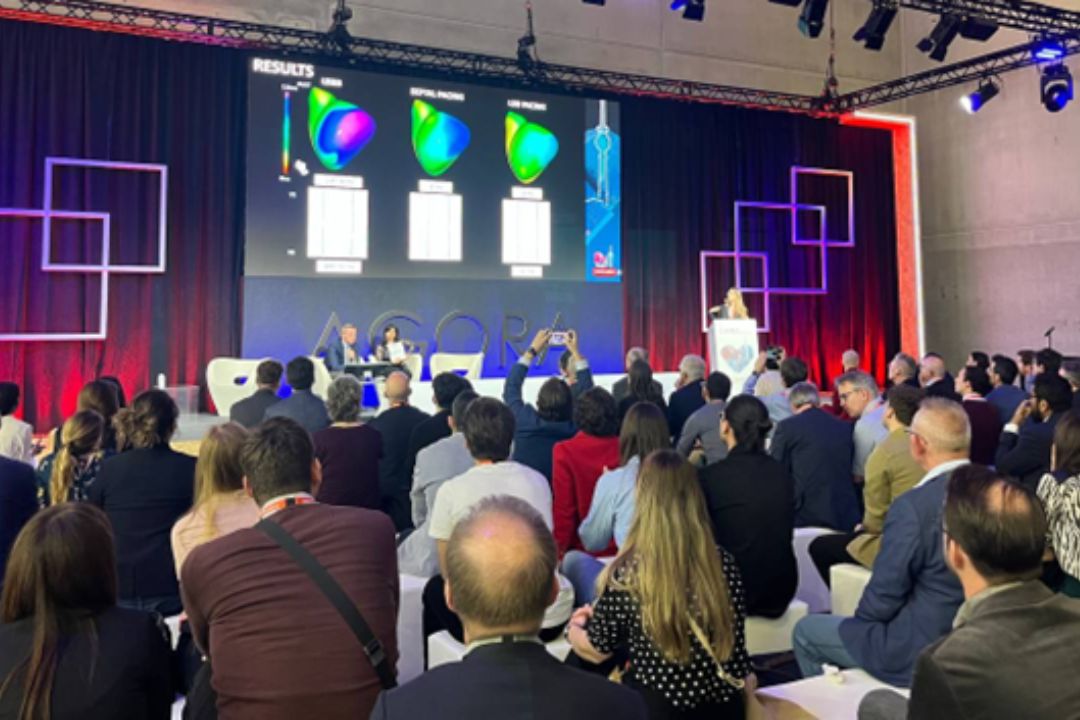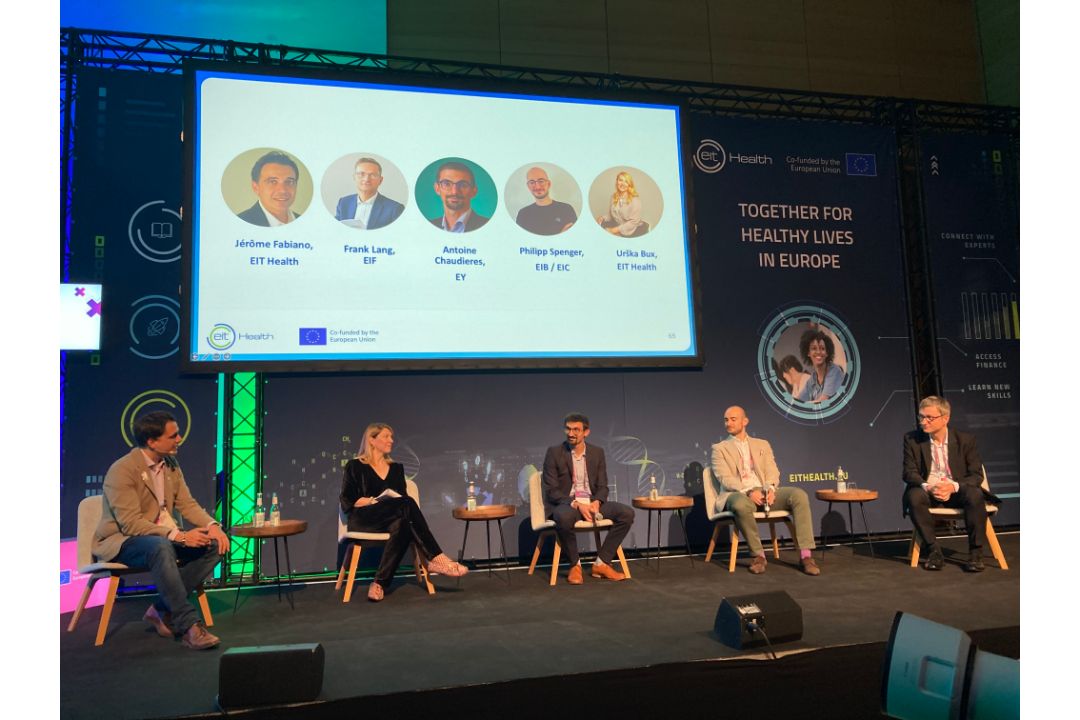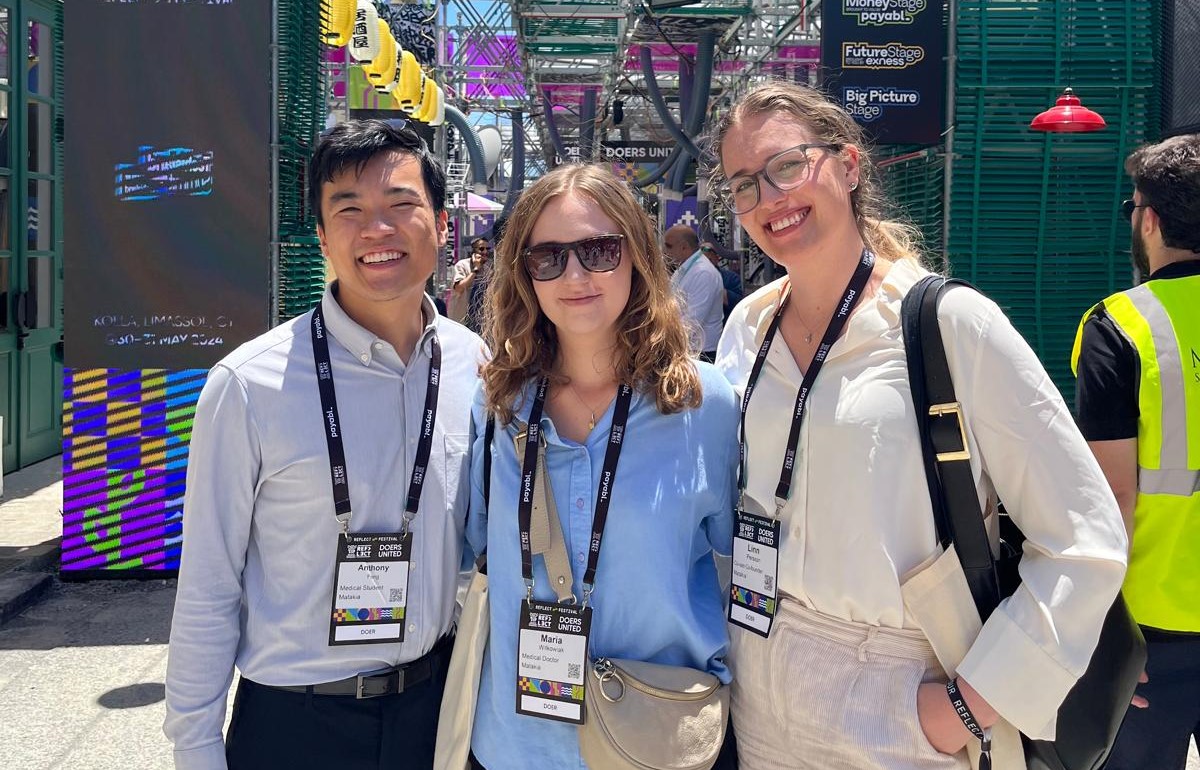7th June 2024
This week, EIT Health took part in the third annual health.tech conference, powered by Bits & Pretzels. The event, which we are proud to be a founding partner of, alongside Roche, took place at the International Congress Center Messe (ICM) in Munich. The 2024 conference was bursting with activity with attendance up by 20% to over 2,500 people, including 1500+ start-ups, 400+ investors, policy-makers, and partners who made up the diverse line-up of 200+ speakers.
During the event, experts explored how implementing digital infrastructure and patient-centric care, and building resilient health systems, will help provide better healthcare and enable European citizens to live longer, healthier lives.
On day 2 of the conference, the Euro Vision Health Stage, run by EIT Health, provided pan-European perspectives on ground-breaking projects and opportunities in the global HealthTech ecosystem, including empowering innovators, accelerating digital health innovation, and how to unlock tomorrow’s potential.
Key Takeaways
How is healthcare embedding new technologies?
“You are the motor of innovation of the whole sector. Everything YOU do saves lives.” (Tobias Gotthardt, Bavarian State Secretary for Economic Affairs)
On day 1 of the conference, there were two sessions on the main stage around how healthcare is embedding new technologies, with the main focus being the EIT Health Catapult programme, a unique competition and training programme that boosts the development of European health start-ups by exposing them to leading experts and international investors.
This year, there were nine Catapult finalists, who said of embedding new technologies into the healthcare ecosystem:
Acorai: “We are listening to the heart with the help of AI, and are the world’s first handheld, non-invasive, intra-cardiac pressure sensing monitor. We intend to establish the new standard in heart failure management.”
Celex: “Celex drugs prevent metastasis in vivo and human data shows compelling 20% reduction in cancer mortality. We are positioned to capture the tyrosine kinase market estimated at GBP 57 billion.”
Digistain: “Chemotherapy is the killer not the cancer. The market is ready for disruption – now!”
Dymium: “Why catch stones when they can come to you? We have developed a technology to turn kidneys stones into magnetisable objects. We don’t leave a stone unturned!”
FiveLives: “There’s no treatment for dementia. Yet. Prevention is the only way to address this huge challenge. We motivate the 50+ aged to improve their lifestyle and assess the risk of developing dementia.”
Nen: “Children have a hard time communicating their pain. Nen addresses pain management through play by gamifying cognitive behavioural therapy. We help them train the brain to beat the pain.”
Pan Cancer: “Our technology empowers a patient’s own immune system to kill cancer cells.”
Polygon: “We aim to drastically reduce the burden of cardiovascular diseases by providing early-stage treatment to patients.”
Saphenus: “There are 50 million amputees worldwide. We help bring back sensory information to the brain, with the world’s first device that gives back feelings to amputees, nearly natural walking and helps reduce or diminish phantom pain.”
Hearing these pioneering healthcare start-ups share how their innovative solutions are meeting unmet health needs with the promise of improving care for millions of people around the world was truly inspiring. The winners of the 2024 Catapult programme, who were announced during the event, can be found here.
Will the European Health Data Space fuel the deployment of AI?
“My goal is to decisively advance digitalisation. It makes healthcare safer and hopefully better. Make healthcare fit for the future. Make efficient use of anonymised health data.” (Judith Gerlach, Minister, Bavarian State Ministry of Health, Care and Prevention)
If implemented effectively, The European Health Data Space (EHDS) has the potential to be transformative. Shared European health data will significantly impact patient outcomes by allowing citizens access and control over their health data as they travel, live, work, or holiday across the EU. To succeed, cross-border interoperability where systems can exchange data because they understand each other without a lot of effort, is key. But because interoperability is only a bridge technology, structures to train basic AI systems are needed. The better the data is structured, the easier it can be analysed, as speakers at this dynamic panel discussion noted.
To discover insights from our ecosystem into how the EHDS can be implemented effectively across Europe, read our latest Think Tank report.
How can we unlock tomorrow’s potential?
“Now is the right time to train the next generation of employees in the health sector.” (Urška Bux, Senior Programme Manager, EIT Health)
Attracting skilled talent across the healthcare ecosystem is a big issue, because there is a gap between health industry needs and fit-for-purpose talents. Closing this gap, which is what the WorkInHealth Foundation is working to do, will help foster health innovation for all. Panellists noted that the top skills missing in the health and biotech space include soft skills, leadership and people management, and sustainability-related skills.
The obvious solution to address this skills gap is training and up-skilling, however, other solutions include hiring and outsourcing, and looking at ways to retain talent such as mentoring programmes.
When it comes to looking for investment, the most important criterion for VCs is a high-quality management team, so it’s important to align your business model on the skills of the people available.
These were just some of the thoughts shared during the session led by WorkInHealth Foundation and EIF, which revealed skills insights from a soon to be released report. Keep an eye on our social channels for updates about the report’s launch.
How to accelerate digital innovation through reimbursement pathways
“Don’t see the closed doors see the open doors, we have a good way established in Germany with the DiGA framework.” (Sebastian Eckl, CEO, ProCarement)
While there are different reimbursement programmes in Europe, DiGA, Pecan etc., the problem is that the systems in different countries are not aligned. So start-ups are often lost because they don’t know how the reimbursement processes work, and they often underestimate the costs and time they must put into the process. Additionally, many think that reimbursement equals adaptation, which is not the case.
Process alignment is key to accelerating digital innovation through reimbursement pathways, accessing Pecan should be as easy as accessing DiGA. Innovation can only happen when there is an open framework that allows people to earn money when they improve people’s lives. But we can’t wait for politicians, the push must come from industry, emphasised one of the panellists in this engaging session.
This is just a snapshot of some of the valuable ideas shared at the health.tech conference. If you didn’t make it this year, we hope you can join us next year as we continue to shape a better future for patients and citizens by facilitating great ideas, conversations and connections, at this transformative event for the healthtech community.
Corify Care obtains CE Mark for ACORYS MAPPING SYSTEM

What it means to obtain a CE Mark
New report reveals skills gaps impeding healthtech innovation

A must-read for healthcare start-ups and venture capitalists
